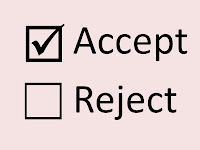Is it worthwhile for scientists to expend the effort to hone their writing skills? One might argue that if the scientific findings are good, then it's not necessary to be the best writer in the world. One might also think that the writing will get polished during editing, so that it's not really essential to spend a lot of time revising and improving the writing before submission. Unfortunately, the competition for space in journals is so keen that such an attitude is not wise. Anything you can do to give yourself an edge is worthwhile.
I was reminded this week of how important it is to submit a highly polished paper when I received an acceptance email. I was pleasantly surprised not only that the paper was accepted, but that the editor and reviewers were so complimentary. The editor even went out of his way to quote the personal comments of one of the reviewers: "Oh, if they were all this easy. This paper was a pleasure to review." The editor went on to congratulate me for this and say that, "If all the papers submitted to [this journal] were so good, it would be marvelous."
I don't often get such compliments, so you'll have to forgive me for savoring the moment. We get so beaten and bruised by most reviews that when one of our manuscripts sails through and even garners some praise, it's reason for celebration.
I also wanted to share the news because it illustrates dramatically why writing skills are important (in addition to good science). We should make it easy for reviewers and editors to enjoy reviewing our manuscripts and to check that accept (with minor revision) box. Reviewers and editors don't get the opportunity very often to handle a really top-notch paper. I know I rarely do. Having reviewed hundreds of papers and served as associate editor, I know what it's like to struggle through inumerable obtuse, boring, poorly organized, and typo-ridden manuscripts. About 90% of the papers I handle are substandard--in the science, the presentation, or both. The well-written, compelling, novel papers are as rare as jewels--at least in my field.
I tell students that the top journals in our field accept only 15 to 20 percent (sometimes less) of submitted papers. This means that to get their paper accepted, it must be better than 80 to 85 percent of all papers submitted to that journal. The percentages vary among journals, but generally, the competition is stiff. Those statistics should be sobering to anyone preparing a paper for publication. Many good papers get rejected by journals, not because there is anything wrong with them, but because there were other papers that were better. Often, the authors of those better papers were able to state their message in a more compelling, interesting, and erudite manner.
The previous posts provide some ideas for developing excellent writing skills and habits. More to come....

1 comment:
You provide an excellent anecdote regarding the importance of self-editing. Along these lines, I attended a seminar on grantwriting strategies this week. One particular comment by the discussion leader stuck out: A badly written grant is rarely forgotten.
Post a Comment